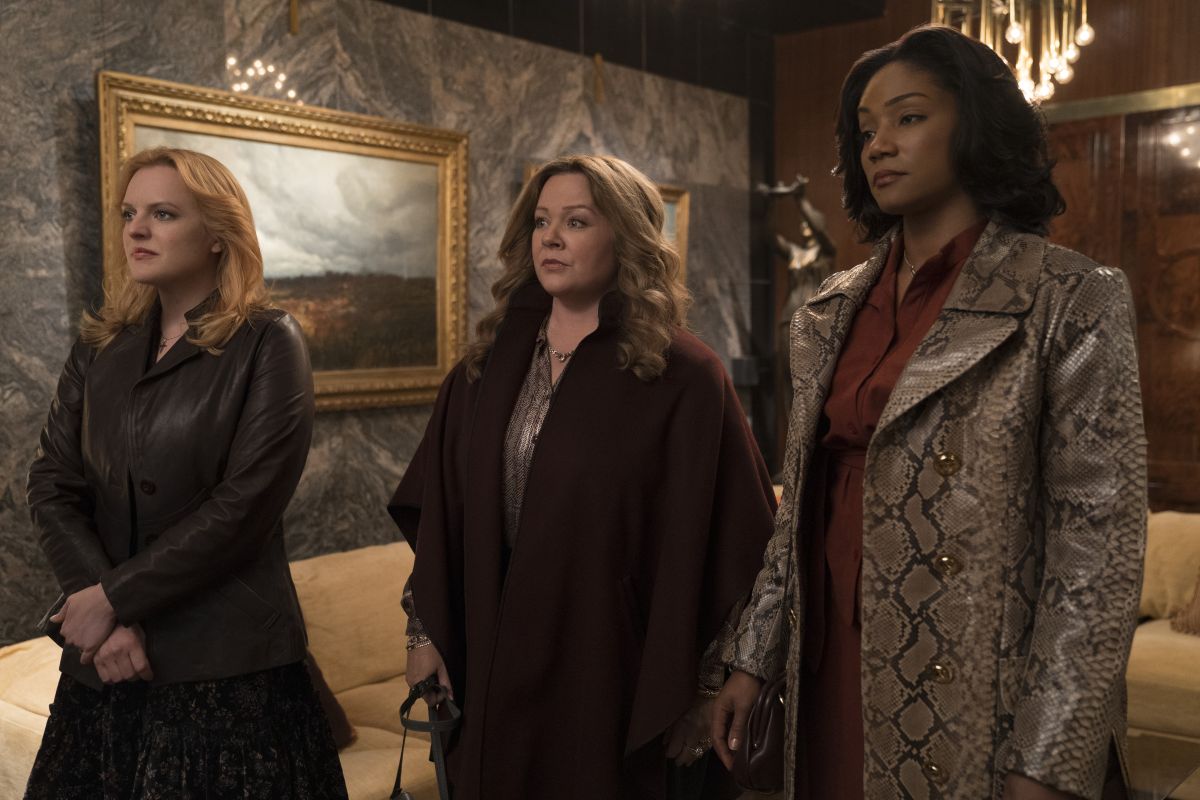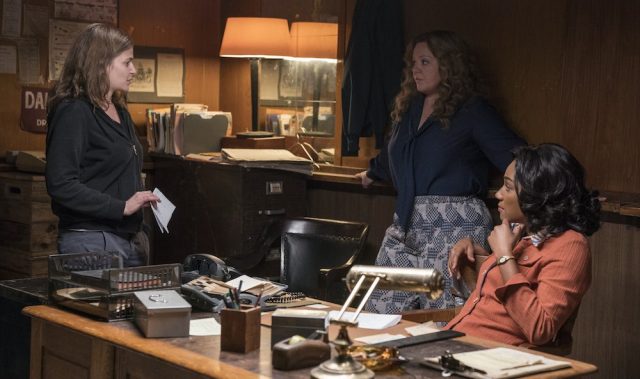The Kitchen featurette highlights the women behind the camera
Warner Bros. Pictures provided ComingSoon.net with the chance to speak 1:1 with writer/director Andrea Berloff about this weekend’s crime drama The Kitchen, starring Elisabeth Moss, Melissa McCarthy and Tiffany Haddish. Check out the full interview below!
RELATED: The Kitchen Featurette Highlights the Woman Behind the Camera
The Kitchen is an adaptation of the DC/Vertigo female-fronted comic book series of the same name. The original series was written by Ollie Masters and illustrated by Becky Cloonan and Ming Doyle. The series takes place in Hell’s Kitchen, New York, in the 1970s and follows the wives of Irish mobsters. Ultimately, the wives step in and take over to start running the business after several men are arrested during a mafia sweep.
Melissa McCarthy (Ghostbusters, The Heat) portrays Kathy, an adoring mother who leads the charge for the women to take over the business. Tiffany Haddish (Girls’ Trip, Night School) plays Ruby O’Carroll, a woman willing to kill anyone who gets in her way, while Elisabeth Moss (The Handmaid’s Tale, Us) plays the role of Claire Walsh, a timid wife of an abusive husband who eventually starts to fall in love with the violence that takes over her life.
RELATED: The Kitchen Trailer: It’s Their Business Now
The cast also includes Domhnall Gleeson (Star Wars: The Last Jedi), Common (Eve), James Badge Dale (World War Z), Brian d’Arcy James (Spotlight), Margo Martindale (The Americans), Bill Camp (The Night Of) and Jeremy Bobb (Marshall).
Andrea Berloff wrote the script for the film and makes her directorial debut with The Kitchen. She is best known for co-writing Straight Outta Compton. Michael De Luca will be producing the film.
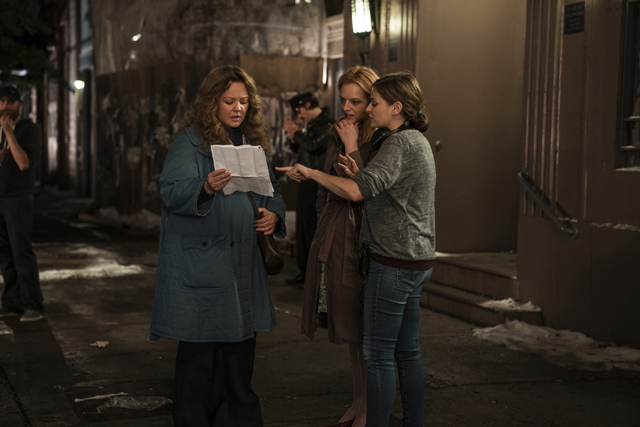
ComingSoon.net: Have you had a chance to see the film with an audience yet?
Andrea Berloff: I have not, not in its finished form. I really believe in watching the movie with audiences every step of the way because I think the audience tells you what they see, and we sit in our little dark room by ourselves and it’s great to get out there and see what people are thinking. That said, I haven’t done that probably since January, and the movie evolved tremendously between January and now. We start screenings this week. So I’m very excited to see it with people and seeing what they think of it.
CS: Can you tell me a little bit about what has evolved during post production?
Berloff: Oh my gosh, so much. Yeah, well, in the final months, so much. You know, the visual effects work, which you probably don’t even recognize, hopefully, but at least half of the movie has CGI in it. So all of that stuff, for the most part, came late.
CS: Right. And that’s because you can’t actually afford to just rebuild huge portions of Manhattan.
Berloff: It’s not just afford it, you just simply can’t. I mean, the skyline of New York is not the same, and so you have to re-do the skyline. But also, we have several shots that are just full-on green screen shots of the women walking down the street, but they’re not, because it just doesn’t exist anymore. It just doesn’t exist. We would dress the streets as best as we could in certain scenes and then clean them up or add buildings or what have you, but in other scenes it’s a fully computer generated set. So there were a lot of people doing a lot of work, so that came towards the end of the process.
CS: In terms of shooting on location in New York City, what were some of the challenges of shooting there as opposed to Toronto or Atlanta?
Berloff: Well, most of the movie was shot on location. We only shot on stages for one scene in Long Island. Everything else was on location and we were in every borough in the city, except Queens. So we were all over the place. I’m really specific about the detail. Every little thing is different. The crosswalks are different. The traffic lights are different. So all of that stuff eventually had to be digitally replaced to be period appropriate. I had a few big stars in the cast, and they are incredibly popular, so we would be out on the streets. We’d have people screaming, “I love you Common.” And we’d have to try that take again. But I never perceived that kind of thing as challenging. I perceived it as fantastic, because Melissa and Tiffany and Common and Elizabeth are all so beloved. How cool was it that they have fans screaming their names on the street and that kind of energy? I don’t need to tell you, New Yorkers have amazing energy, and that kind of infectious New York energy really fed what we were doing. So although it was like, okay, we’ve got to do another take because somebody screamed over it, it was also like, “how lucky are we to have such energy and support?”
CS: I don’t know if you think this is true, but I feel like New Yorkers are a little bit more… I don’t know if it’s respectful or just blasé about seeing celebrities? We tend to keep our distance.
Berloff: Well, nobody was keeping their distance while we were shooting. I wouldn’t say that. But I would say that once people understood like, “hey, if you scream over it, we’re not going to get our work done.” I’m saying, you treat people with respect, they treat you with respect back, right? So as long as we explained like, “hey, we love you, too, but could you just be a little quieter when the cameras are rolling?” Then everybody was pretty cool. We had no real issues with that sort of thing.
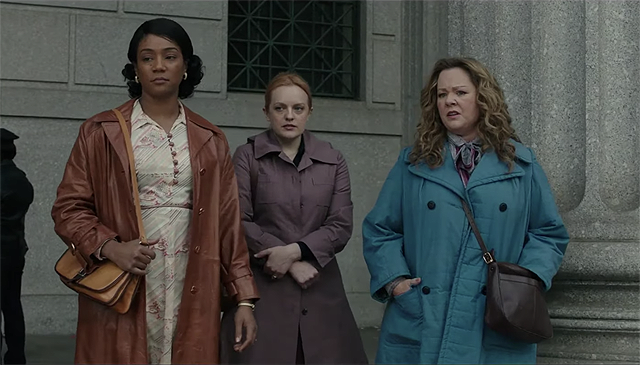
CS: A lot of people going into this wouldn’t really know aesthetically, because there’s no capes or anything, but it is based on a comic book. Can you talk a little bit about adapting it from that Vertigo title?
Berloff: Sure. So obviously based on a comic book by Ollie Masters and Ming Doyle, written by Ollie and illustrated by Ming, and I read it in February 2016. The studio sent it to me. And I actually loved it and loved the whole idea of women taking over the mafia and how would they do it differently than men. And I love the idea of creating a piece in Hell’s Kitchen because it had been a long time since we’ve seen a Hell’s Kitchen set movie. Obviously, there’s been many over the years, but it’s been a long time. And I actually lived in Hell’s Kitchen for a little while, so at the beginning it was like, “oh, I know exactly what that world is and who those people are and what that neighborhood feels like.” So it felt really personal to me. And I would say that the logline of the comic book is still the logline of the movie. It’s still the same basic premise. It’s all Ollie’s and Ming’s but I went ahead and felt the freedom to really make it my own. So for example, Tiffany Haddish’s character is not in the comic, nor is Margo Martindale’s character. I went off on a journey when I was given the go-ahead.
CS: Right. Well, Tiffany was the standout to me, because I don’t think we’ve gotten to see this level of range from her yet. Even though she’s having all this success in the comedy world, for her to dive headfirst into a true dramatic role is pretty cool to watch.
Berloff: Isn’t she so good? I mean, she’s so good in this, and I just cannot wait for people to see it, to see specifically what she can do, because I think she’s going to knock people’s socks off. Particularly in the first week or two, I kept watching take after take and being like, yeah. It’s so exciting to watch her work and to have a front row seat to what I knew the rest of the world was going to find so exciting. So I got really lucky with her.
CS: Obviously Elisabeth Moss has been doing the dramatic thing for a long time, but did it worry you that people might see a movie with Tiffany and Melissa and think that it’s going to be something that it’s not?
Berloff: I would say we paused for a grand total of 45 seconds. And then, here’s why. It is not easy to get people to go to the movies in 2019, to get them to go to the theater. You have to give them a reason. You know, so many movies you can see at home, you can stream later. “Oh I’m busy right now, I’ll see it later.” This is a reason to go to the theater. You’re going to see two of your favorite actresses do stuff you’ve never seen them do before. It creates a conversation. It creates a buzz, number one. Number two, they are incredible in these performances. They both are. I mean, Elisabeth, as you said, everybody knows she’ll be amazing. But Melissa and Tiffany, I think nobody’s going to have any idea what they’re capable of, and I think it’s going to create a lot more buzz around the movie, frankly. And I think they both are fantastic actresses. It’s not like we were compromising in any way. They are fantastic. I think part of the reason they wanted to do this is that they don’t get the opportunity to play these kind of parts very often. So I think that was appealing to them, to be able to tackle these sorts of roles.
CS: It very beautifully dovetails with the thematics of the film, which is these are a group of women who people don’t expect to behave in this way or to be this tough and so on.
Berloff: That’s right. They’re pigeonholed. The characters are pigeonholed. The actresses are pigeonholed and all of that is the thematics of what we’re trying to deal with, which is these confines don’t serve anyone and don’t we all want to bust out of whatever box we’ve been put in.
CS: I know that this is based on something fictional, but in your research, did you find any basis for females running numbers rackets or any sort of mafia connected organizations?
Berloff: No, that’s not true at all, but I did make sure that I peppered in a lot of true stuff to make it feel true. So obviously, there really was an Irish mafia in Hell’s Kitchen. They really did have a hitman who was a Vietnam veteran, who was undone by not cutting up the body properly and it floated to the top in the river. The Italian mafia and the Irish mafia really did eventually go to war over the building of the Javitz Center. So once I learned that, “Oh, that’s how you bring the Italians in, that’s how you start creating bigger stakes, is through the Javitz Center and that construction job, that kind of tied a lot together for me.” So the research really did serve me and serve how I created the plot. But in terms of the women taking over the Irish mafia, no, that part’s fiction.
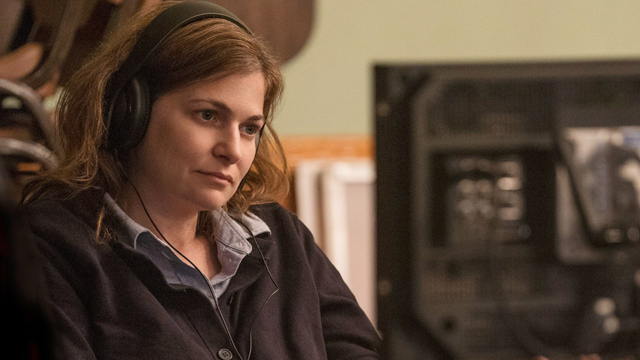
CS: At one point somebody refers to a millionaire real estate guy and his prick son. Is that who I think you’re referring to?
Berloff: We will leave that open to interpretation, but if you were to go back and research who may have done some real estate deals to enable the Javitz Center to happen, you might find the answer.
CS: Okay. Well said. Diplomatically put.
Berloff: Thanks. But you are one of the first people who’s picked up on that, so well done. Thank you.
CS: I laughed out loud.
Berloff: Okay. Great. It really just goes right on by everybody.
CS: There’s a lot of pitfalls to anybody making a directorial debut, but having been in the business for as long as you have, what did you come into it with, so that you’re like, “I know I’m going to make mistakes, but I’m not going to make this mistake, this mistake…”
Berloff: Right. Well, listen, I’m sure I made plenty of my own mistakes. But one thing I was really adamant about was that I was going to run a set that was respectful and calm. I had a really lovely, very long career, and I think being on a million sets prepared me better than any other experience to take on my first directing job. That said, it also let me see a lot of… I have been on sets that have run well and sets that have not. And in my opinion, the ones that run well by and large are the ones in which people are comfortable and confident in their work and feel respected. So I wasn’t going to scream at anybody. I’m not a screamer, anyway, but if you go to your boss and your boss screams at you, you’re not going to go to your boss a second time, a fifth time, when you have an idea or when you have a problem because nobody likes being screamed at. So I was just really adamant that we were going to have a respectful environment where I hired fantastic people who did really top notch work, and if there was a discussion to be had, we were going to have a discussion. Nobody was going to start screaming. So for me, that was really the goal that I set out with was to make sure everybody felt valued, because I knew it would make them bring their A-game, and they did.
CS: That said, as prepared as you were coming in, what was something that surprised you about the process?
Berloff: What was something that surprised me? I don’t know. I mean, again, I have been on so many sets it’s hard. I think I was open-minded to the idea that anything could happen because I’ve seen it all happen in so many different ways. You know, I think what I was not prepared for, and this is going to sound so hokey, but how much the three women actually delighted in each other and enjoyed each other’s company. And that is really hard to manufacture. You can’t make people like each other, you know? They actually did and got along great. I feel like that infectious energy of them just enjoying each other’s company bleeds over onto the screen. So as much as I might’ve tried to make that happen, I couldn’t control that. It just happened organically. So I was really, really happy that happened.
CS: You made an interesting choice in that there’s no sort of narration like you’d find in a Scorsese movie. It is just one scene after another and the audience kind of has to put the pieces together in their heads.
Berloff: Right.
CS: So what made you come to that decision as opposed to having a narration?
Berloff: I think audiences are very savvy and I find nine times out of 10 that the narration is unnecessary. The audiences know what you’re getting at. Just give them a second and they’re going to catch up with you. I find that it is so easy to underestimate audiences, and unless there are genuine holes in the storytelling that you wouldn’t discover until you’re back in editing and you’re like “uh oh, people aren’t understanding when we jump from here to there.” But most of the screenings we did, people understand what we’re saying. It doesn’t mean that they understand in that scene, and maybe they’d need a scene or two to catch up and then they get it, but nobody’s confused by what’s going on. I think it’s so much cooler to be out of sync as a moviegoer and to try to be activated in that way than to have everything handed to you.
CS: You’re covering a fair amount of time, too. The film takes place over several years, right, at least three or four?
Berloff: 18 months. Yeah.
CS: Were there any specific landmarks or specific things that you wanted to do visually? I know one of the tricks that a lot of people talk about when they’re doing a film set in a certain era is if this film is set in the mid-70’s, that doesn’t mean every car is going to be from the mid-70’s. There’s going to be cars from the 60’s and the 50’s.
Berloff: That’s right. So you have stuff from the 60’s, right. And you’ll see, for example, Margo Martindale’s character Helen, who’s older, a lot of her clothes are from the early 60’s, because you’re not always going to run out and buy new clothes every year. So her wardrobe is not of the moment, 1976. Same goes for particularly Claire as the movie begins. It’s stuff that might be a few years old. So we were very conscious about building that sort of thing, and then, with cars as well, there’s some really fun cars from the 50’s that are peppered in throughout. Because you’re right, the world doesn’t just evolve for one year. Old stuff sticks around for a while.
CS: It is a mafia movie, so you’ve got to have a lot of good pop song needle drops and you have that. Could you talk a little bit about assembling the soundtrack and why you chose certain bands over others?
Berloff: Yeah. Sure. Well, I had an incredible music team with Deva Anderson as music supervisor and Mitsuko Yabe as music editor. We worked really hard, I have to say. It does not just happen. It was hundreds of hours of manpower went in to finding the best songs. I am somebody who cares a lot about what music looks like and feels like on films. More than anything, I wanted this movie to feel empowering and fun and by the end I want people to feel like they, too, can go take on the world and they can make change happen for themselves. I want them to leave the experience feeling like, “Yes, look what I can do. Just don’t underestimate me, here I come.” So I really wanted to find these anthemic songs that are uplifting and exciting and kind of let you rock out in that great 70’s way. There’s an incredible trove of music, as you can imagine, from the 70’s that we had to play with. It was really hard to go through all of our options and find the best ones.
CS: There were no specific songs where you were like, “I just have to have that song”?
Berloff: No, no, I didn’t feel that way. I always am like, bring me 50 options, because if you hire really great people around you, it’s quite possible they’re going to have a better idea than I had, which I would hope they would. And that’s part of the fun, joyous process of making a movie, is inviting incredible collaborators into the process and seeing what they bring to the table. So I would never have said to anybody, “Here’s the one and only option. Forget it, if we can’t find it.” It’s just not how I operate.
CS: Were there any specific films, not even necessarily mafia films, that you looked to for inspiration when you were first conceiving your vision for the film?
Berloff: Yeah, I looked really heavily at “Thelma and Louise”. It was one of my favorite movies when I was a teenager. I love the idea of these antihero women succeeding. That was something I really keyed into because obviously, the women in my film are not angels, but they are our heroes, and I think it’s really important for us to start to think about opening up the idea of what women are like in films. And figuring out a way to allow for women to not be perfect in cinema. So “Thelma and Louise” was a perfect example of that.
CS: When you were thinking about your characters specifically, were there certain boundaries that you didn’t want them to cross in order for the audience to stay on their side?
Berloff: Well, yes. They’re not maniacs, right? They kill for a reason, and I felt like as long as there was a reason, as long as you understood their reasoning, as long as you understood why, that this was survival. They had no other opportunities. They had to make this life work for themselves. You’ll go along on the journey with them.
The Kitchen
-
The Kitchen
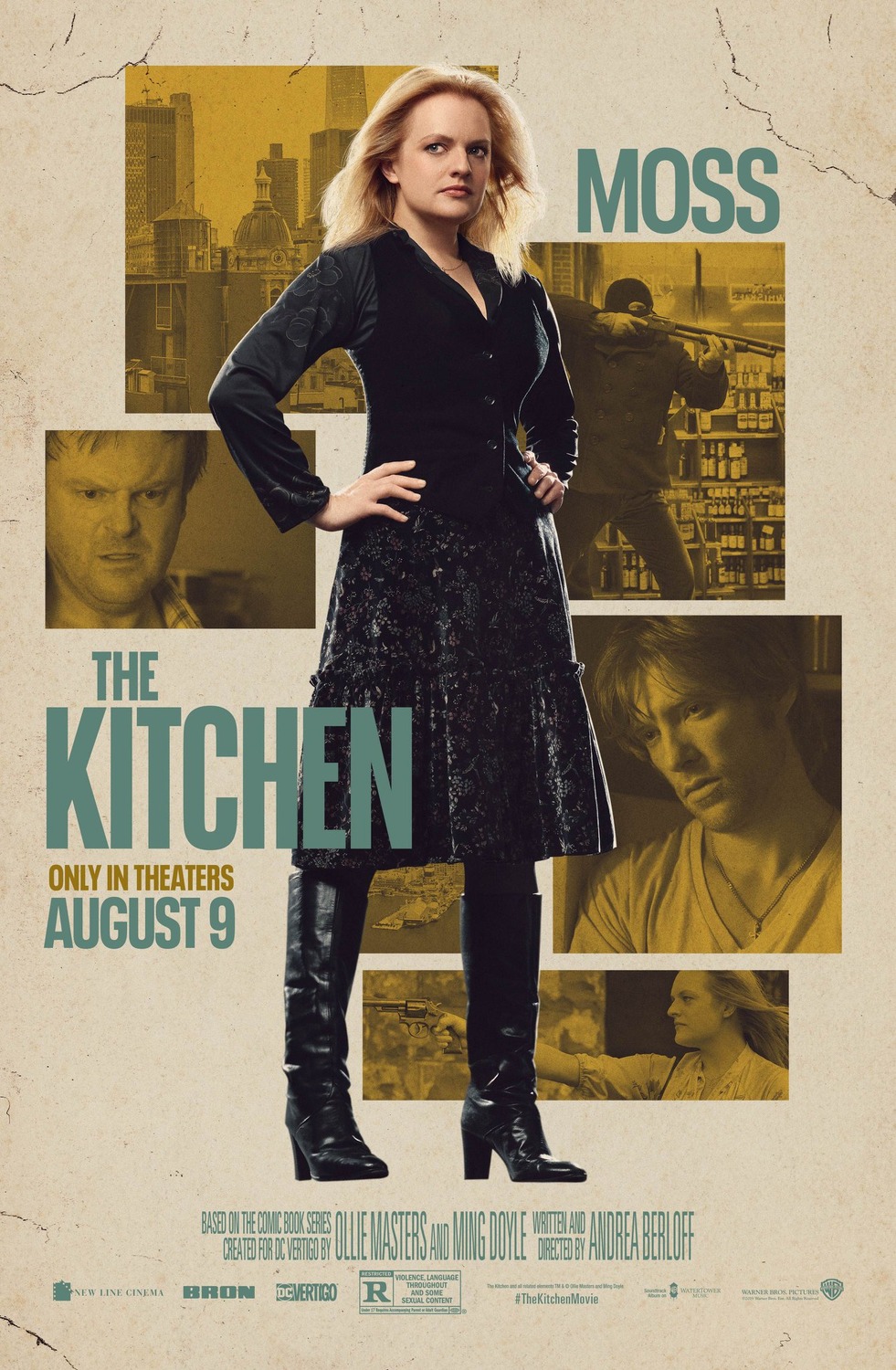
-
The Kitchen
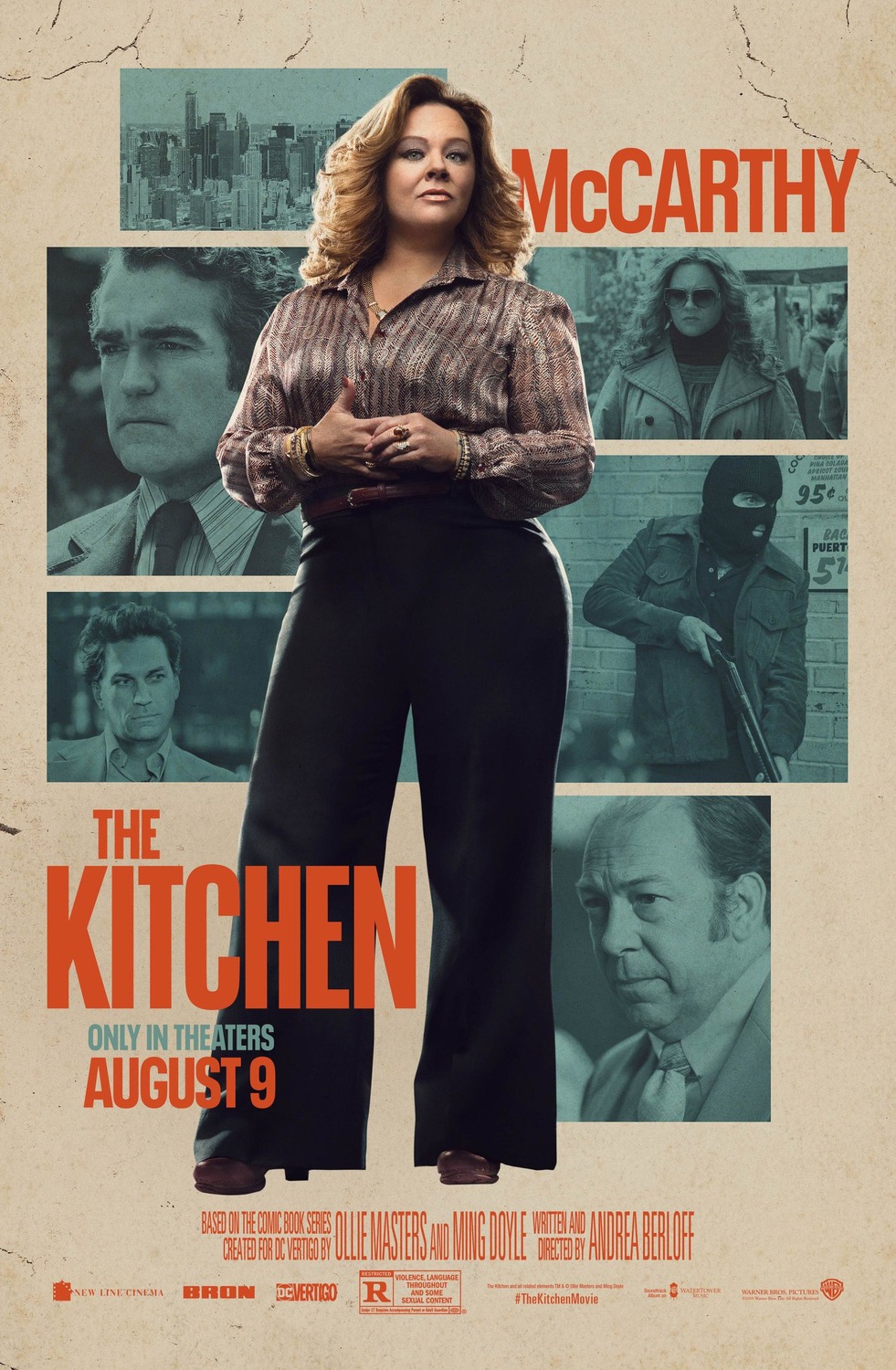
-
The Kitchen
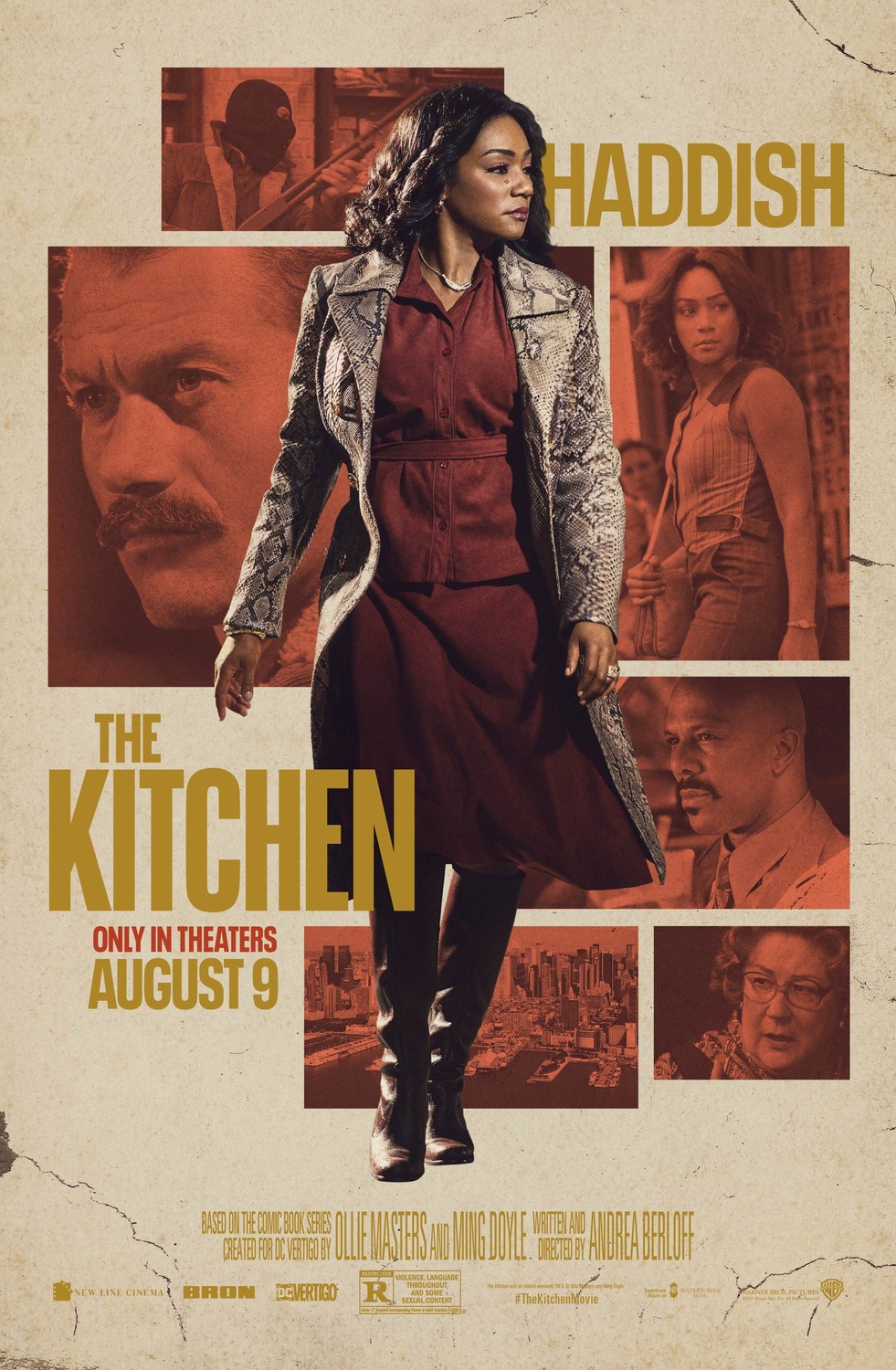
-
The Kitchen

-
The Kitchen
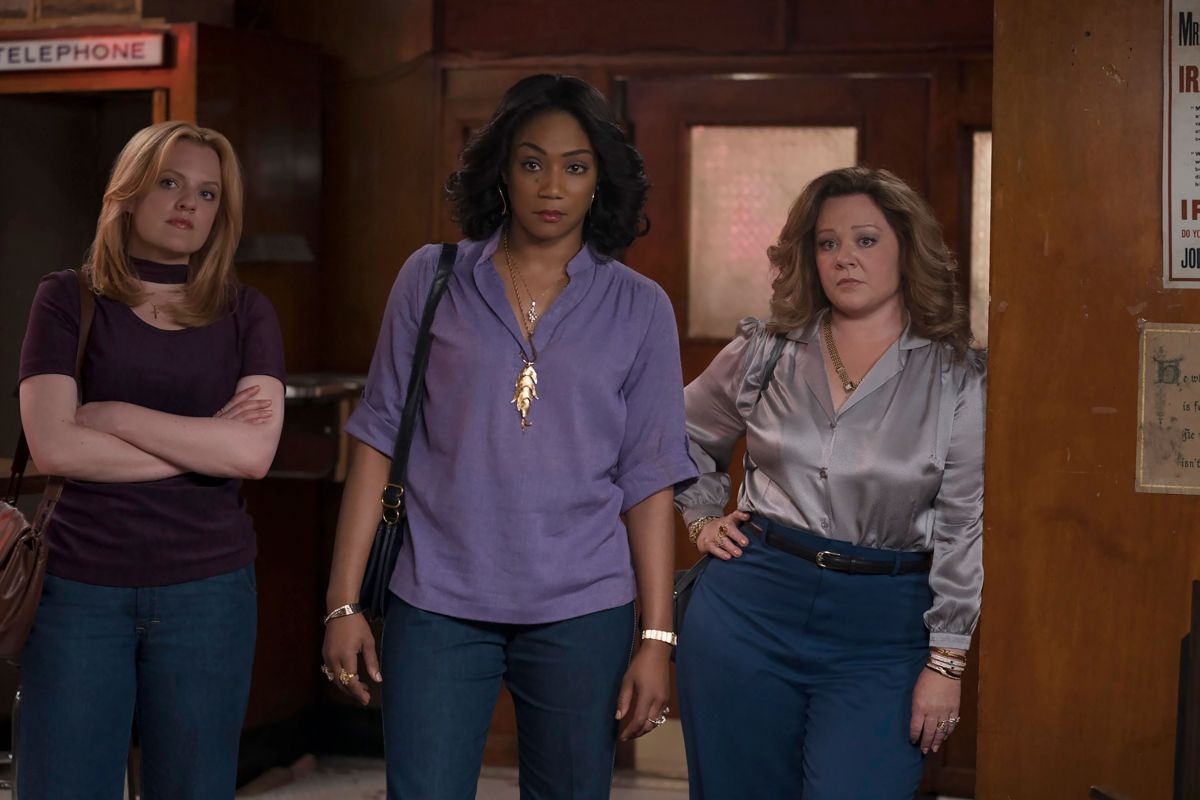
-
The Kitchen
